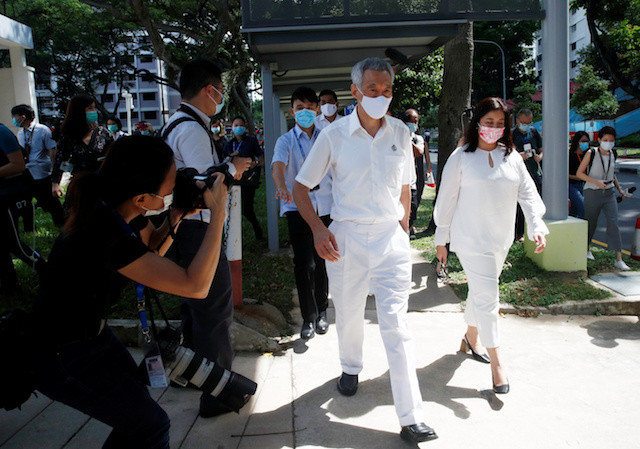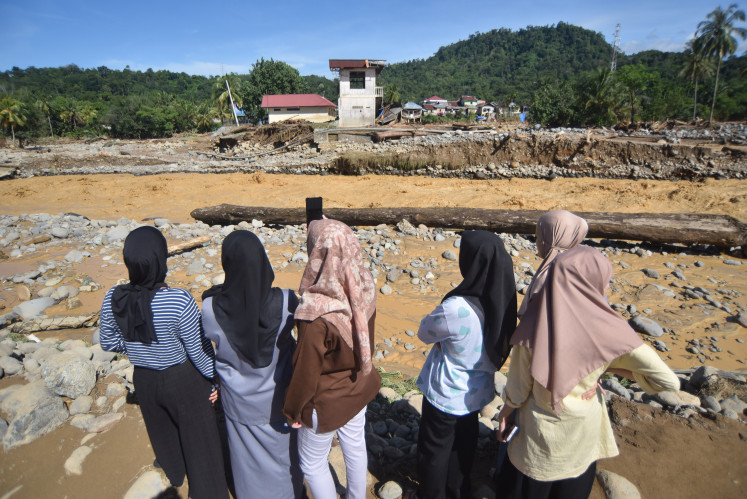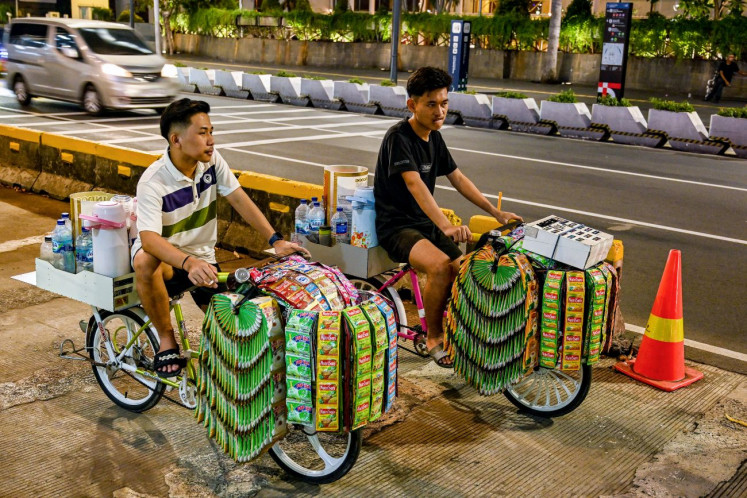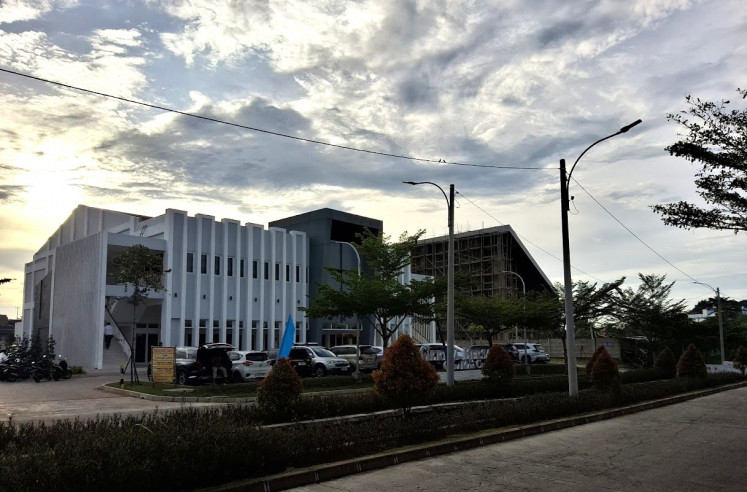Popular Reads
Top Results
Can't find what you're looking for?
View all search resultsPopular Reads
Top Results
Can't find what you're looking for?
View all search results2020: Elections and democracy in the four Asian tigers
Korea and Taiwan have voted for continuity, with the liberal factions prevailing once again. On the other hand, there have been drastic changes to Hong Kong and Singapore's political landscape before the elections began.
Change text size
Gift Premium Articles
to Anyone
T
he year 2020 marks an important moment of elections for the four Asian tigers: Taiwan was the first to head to the polls for its presidential election in January; this was followed by Korea with its National Assembly elections in the midst of the coronavirus pandemic in April; entering into the second half of the year, Singapore has started campaigning for the General Election in July; last but not least, Hong Kong’s Legislative Council will be electing its new cohort in September.
Korea and Taiwan have voted for continuity, with the liberal factions prevailing once again. On the other hand, there have been drastic changes to Hong Kong and Singapore's political landscape before the elections began.
Since Taiwan became the base of the nationalist Kuomintang following the Chinese Civil War, the island has been ruled by a dictatorship whose reign is associated with white terror. The 38-year-long martial law was finally ended in 1987, paving the way for a popularly elected presidency.
President Tsai Ing-wen of the Democratic Progressive Party was first elected in 2016 after Kuomintang’s Ma Ying-jeou served two terms. She sought reelection and was challenged by pro-Beijing Kuomintang candidate Han Kuoyu. Han was elected mayor of Kaohsiung, Taiwan’s major port city, in the 2018 local elections wherein the ruling Democratic Progressive Party (DPP) suffered a major defeat.
However, the DPP was able to regain public confidence in a short span of time, and this is partly due to heightened anti-Beijing sentiment following the pro-democracy protests in Hong Kong. Han’s warm attitude toward Beijing became his undoing, he was defeated and would later be impeached and relieved of his mayor duties in June.
Korea’s democratization also took place toward the end of the 20th century. May 18 this year marked the 40th anniversary of the Gwangju Uprising, which was an important chapter of Korea’s struggle against the military dictatorship. After years of protests against the military dictatorship, the Sixth Republic was born in 1987. However, it was only until the late 1990s that a true civilian president was elected.
President Moon Jae-in was elected and sworn in in 2017 following the impeachment of his conservative predecessor Park Geun-hye. Like Tsai’s party in Taiwan, Moon’s popularity hit a record low two years into his presidency, worsening again earlier this year due to the pandemic. At one point Korea had the largest number of confirmed cases outside China, and there has been a petition to impeach Moon.
The National Assembly elections took place on April 15 as scheduled. Fortunately for Moon, Korea has been able to flatten the curve in time and the public opinion turned to his favor. The liberal faction won the National Assembly elections by a landslide, winning a three-fifths super-majority and giving Moon a strong mandate.
Singapore’s People Action Party (PAP) has been in power since the colonial era, winning every single general election and all but two constituencies in the 2015 General Election. Prime Minister Lee Hsien Loong called the 2020 General Election on June 23, which is said to "clear the decks" for a refreshed mandate. There has been a proliferation of opposition parties for this cycle and the PAP stated that there will be more opposition MPs than before.
A major spotlight in this election cycle would be the addition of the Progress Singapore Party (PSP) founded by Tan Cheng Bock. Tan is a former PAP veteran in parliament, now contesting for the West Coast constituency. Lee Hsien Yang, brother of PM Lee, announced his membership with the PSP last month. He voiced his support for Tan, saying the ruling party had “lost its way”. However, he will not be contesting in this election while PM Lee will be stepping down from his post soon.
In 2020 we would see the retirement of a former PM and likely a transition from the current PM to the next one: Goh Chok Tong will be retiring from politics, vacating the Marine Parade seat he has held since its establishment; Heng Swee Keat, on the other hand, has been announced as the “4G” leader in 2018, in preparation for the country’s transition to the fourth generation.
Led by leader of the opposition Pritam Singh, the Workers’ Party gained applause for its trailer video. The video also signaled Nicole Seah’s return to politics, and it was later revealed that she would be running for parliament in the East Coast. Perhaps as a response to this move by the WP, incumbent Deputy PM Heng Swee Keat also ran for the same constituency.
Seah was the youngest candidate in GE 2011 and described as the second most popular politician online, after the country’s founding PM Lee Kuan Yew. She ran against Goh’s team and won 40 percent of the vote in Marine Parade, which is impressive given that the opponent was a former PM. In his book Tall Order, Goh said Seah’s articulateness “reminded him” of former opposition leader JB Jeyaretnam, who was the first non-PAP MP elected since independence.
Having competed with a former PM, Seah is now running against the country’s incoming PM - at this point it is unknown what would happen to the succession plan if Heng Swee Keat was not elected. With the return of Tan Cheng Bock and Nicole Seah on each side of the island, Singapore’s GE 2020 will no doubt be an intense one.
A year after the antiextradition bill movement erupted, Hong Kong is now preparing for the looming Legislative Council elections. The pro-democracy candidates won by a landslide in the 2019 District Council elections; now pan-democrats and localist factions are working together to hold primary elections between July 11 and 12, with the ultimate goal of achieving a “35+” majority in the Legislative Council. A challenge would be finding the optimum balance as Hong Kong’s legislature follows a proportional representation system. If they succeed, however, this would be a strong rejection of the Beijing agenda.
That being said, a significant game-changer for Hong Kong would be the national security law that entered into force on June 30. The Law of the People's Republic of China on Safeguarding National Security in the Hong Kong Special Administrative Region is said to be the “official death” of “One Country, Two Systems” in Hong Kong. Immediately after the promulgation of this law, several political parties and advocacy organizations were dissolved. This includes localist party Demosisto, and its former leader Nathan Law left the city to lobby for international support. Enforcement of the law began immediately and on July 1, the police arrested 10 who allegedly violated this new law.
This law is a departure from the city’s longstanding Common Law tradition, making its enforcement highly unpredictable. With a pro-democracy primary election coming up in a few days, the candidates have had to revise their campaigns in a very short time frame.
The elections in the Asian tigers have wider implications for the region. With Tsai Ingwen’s reelection, the implementation of her New Southbound Policy will be continued. Engaging 18 countries ranging from India to New Zealand, this policy is convergent with the United States’ Free and Open Indo Pacific (FOIP) strategy. Similarly, the victory of the Democratic Party is a reinforcement of Moon Jae-in’s mandate and will allow him to continue carrying out his New Southern Policy for the rest of his tenure. With China’s relative influence declining at the moment, Taiwan and Korea will play a bigger role in shaping the Asia-Pacific geopolitical order.
The story of the four Asian tigers has shown that economic development does not necessarily entail the development of democracy. Korea and Taiwan have paid a huge price in blood and sweat on their quest for democracy. Moreover, it is worth noting how the ruling parties in both countries fell out of favor but were able to turn the tide right before their elections - reflecting the ever-changing nature of public discourse in democracies. Hong Kong and Singapore now stand at a crossroads and it would be intriguing to see whether the two cities will be truly embarking on a road toward democracy.
***
The writer is a research assistant at the University of Hong Kong, currently based in Seoul.










